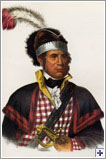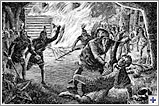The Story of Chief McIntosh and the Creek Indians

William McIntosh was a controversial chief of the Lower Creeks in early-nineteenth-century Georgia. His general support of the United States and its efforts to obtain Creek territory alienated him from many Creeks. He supported General Andrew Jackson in the Creek War of 1813-14, also known as the Red Stick War and part of the larger War of 1812 conflict (1812-15). His participation in the drafting and signing of the Treaty of Indian Springs of 1825 led to his execution by a band of Upper Creeks led by Chief Menawa.
William McIntosh Jr., also known as Tustunnuggee Hutkee ("White Warrior"), was born around 1778 in the Lower Creek town of Coweta to Captain William McIntosh, a Scotsman of Savannah, and Senoya, a Creek woman of the Wind Clan. He was raised among the Creeks, but he spent enough time in Savannah to become fluent in English and to be able to move comfortably within both Indian and white societies. McIntosh was related by blood or marriage to several prominent Georgians. Governor George Troup was a first cousin, and Governor David B. Mitchell was the father-in-law of one of McIntosh's daughters.
McIntosh's support of the United States in the Creek War of 1813-14 earned him the contempt of many Creeks. He led a contingent of Lower Creeks at the Battle of Horseshoe Bend against the Red Sticks, who were primarily Upper Creeks opposed to white expansion into Creek territory. In the wake of that war, the Creeks suffered famine and deprivation for several years.

Governor George Troup was determined to enforce the Compact of 1802 that called for the extinguishment of all Indian titles to land in Georgia. Despite the fervent opposition of many Upper Creeks, and with Troup's assurances of protection, Chief McIntosh, together with a small contingent of mostly Lower Creek chiefs, signed the second Treaty of Indian Springs, in 1825. This treaty provided for the cession of virtually all Creek land remaining in the state of Georgia in exchange for a payment of $200,000. On February 12, 1825, only six chiefs, including McIntosh, signed the document. McIntosh's motives have since been debated. His supporters suggest that he acted pragmatically, believing that the Georgians' relentless demand for Creek land made its loss inevitable. His detractors suggest that he acted to spite his enemies, flouting Creek law and profiting personally.

Whatever his motivations were, McIntosh's participation in the 1825 Treaty of Indian Springs cost him his life. According to a Creek law that McIntosh himself had supported, a sentence of execution awaited any Creek leader who ceded land to the United States without the full assent of the entire Creek Nation. Just before dawn on April 30, 1825, Upper Creek chief Menawa, accompanied by 200 Creek warriors, attacked McIntosh at Lockchau Talofau to carry out the sentence. They set fire to his home, and shot and stabbed to death McIntosh and the elderly Coweta chief Etomme Tustunnuggee.
